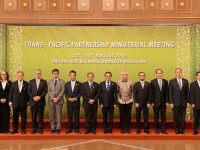The initial Canadian press coverage on the conclusion of the Trans Pacific Partnership negotiations has unsurprisingly focused on the dairy sector, with word that the government plans to effectively create a milk tax by transferring billions of dollars to dairy farmers without any evidence of loss. Lost in the coverage are the copyright and privacy implications of the deal. From a copyright perspective, it is notable that the Canadian government has sought to downplay the TPP, releasing a summary that suggests that it is consistent with current law. The government’s description of the copyright provisions in the TPP state:
Latest Posts
TPP Negotiations Conclude: What Next for the Trade Deal Without a Public Text?
The Trans Pacific Partnership negotiations concluded early this morning in Atlanta with the 12 countries reaching agreement on the remaining outstanding issues. The U.S. quickly posted a summary of the TPP and the Canadian government has followed with its own package on the deal. At a just-concluded ministerial press conference, the ministers noted that this is one step in a longer process. The text itself must still be finalized and then each country will have its own rules before signing onto it. In the U.S., there is a review period with the full text, so this will be a 2016 issue. In Canada, new treaties must be tabled for review in the House of Commons, so there will be a Parliamentary review.
With the election only two weeks away, that means that there will be no text to review before the national vote. Instead, Canadians will face a barrage of TPP claims:
Why Universal, Affordable Internet Access Should be 2015 Election Campaign Issue
The long election campaign of 2015 has featured a myriad of daily policy announcements as the three largest political parties vie for attention and votes. From targeted tax cuts to new spending promises, political leaders have focused on education, child care, defence, the environment and more. Yet thus far largely missing from the campaign has been the most fundamental digital issue – universal, affordable broadband Internet access.
My weekly technology law column (Toronto Star version, homepage version) notes that the Conservatives pointed to their spending on broadband in August when few were paying much attention, but that policy has done little to stem Canada’s steady slide in the global broadband rankings which indicate that Canadian Internet services are middling at best when compared to other developed countries. The opposition parties have said even less, failing to take advantage of consumer frustration by unveiling innovative policies that might address the issue.
The TPP End Game and the Canadian Election
Negotiations aimed at concluding the Trans Pacific Partnership are underway in Atlanta with plenty of signs that the various countries are prepared to compromise in order to reach a deal when the ministers (including Canadian International Trade Minister Ed Fast) arrive toward the end of the week. Canada has already caved on most intellectual property issues (copyright term, etc.) and Prime Minister Harper recently signaled Canada’s willingness to cave on the issues related to the auto sector and the dairy industry. Meanwhile, Japan is said to be ready to compromise on rice and there is a proposal on biologics that may not change much, but could be enough to garner support from some Asian countries.
While I think there remain questions about whether a caretaker government can/should be committing to such significant changes (the New Zealand Minister of Trade noted that Canada is negotiating as if there is no election underway), the TPP is clearly viewed as a major political prize by the Conservatives in the midst of an election campaign. The usual suspects (Chamber of Commerce, Council of Chief Executives, etc.) presumably have their press releases and quotations of support for a done deal already submitted and even opponents in the auto sector are reportedly afraid to criticize the government.
How a Dancing Baby Struck a Blow for Balanced Copyright Law
In February 2007, Stephanie Lenz, a California mother of a pair of young toddlers, shot a short video of her children dancing in the family kitchen with the Prince song “Let’s Go Crazy” playing in the background. Lenz proceeded to upload the 29 second video to YouTube so that friends and family could see it.
Thousands of hours of user-generated video are posted online every day and there was nothing particularly remarkable about the dancing baby video. What set it apart, however, was that several months later Universal Music Group, Prince’s music label, sent a takedown notice to YouTube claiming that it infringed its copyright.
My weekly technology law column (Toronto Star version, homepage version) notes that similar takedown notices are sent to Internet intermediaries such as Google every hour. Yet this particular takedown demand seemed so at odds with the law (few experts believe it infringes copyright) that it sparked an eight year court battle in the United States and served as the inspiration for a 2012 Canadian copyright reform that protects users and websites that create and host non-commercial user-generated content.











